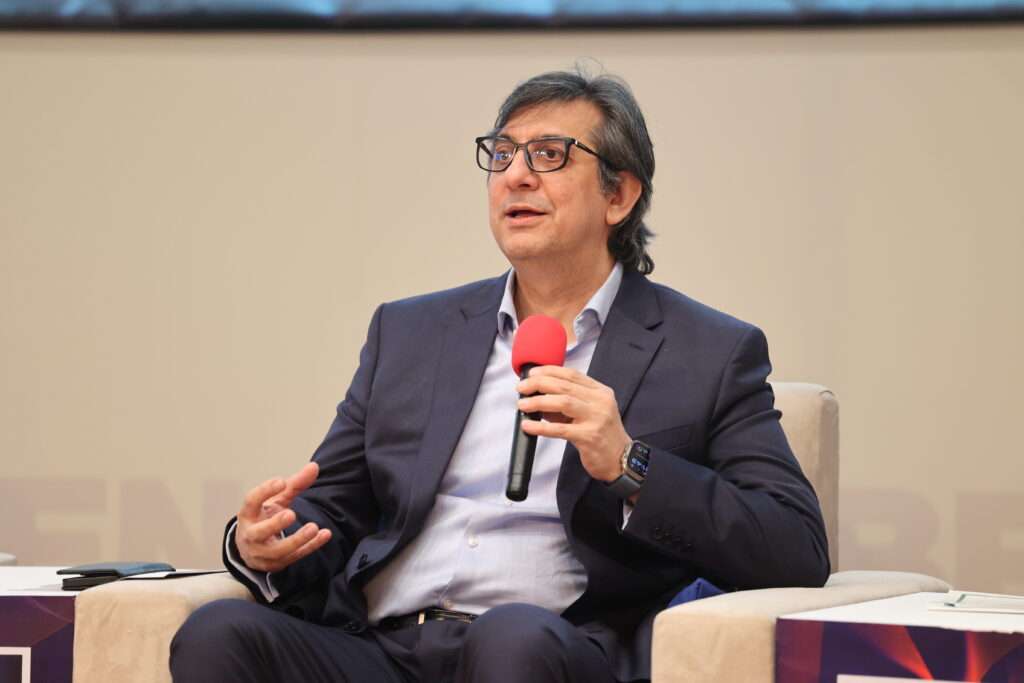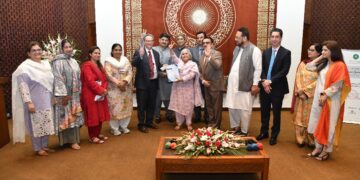KARACHI, APRIL, 2024: The Karachi Film Society (KFS) in collaboration with Habib University organised the Pakistan Media Summit 2024 – a ground-breaking gathering of policymakers, industry leaders and academia at Habib University. The first day of the two-day Summit began with a welcome note from the host Tazeen Hussain (an actor and educator), followed by a brief speech by Dr Ishrat Husain on how media influences economics expectations, which set the tone for the first panel discussion of the day titled: ‘The Role of Media in the Development of the Economy’.


Nasir Hussain Shah, Minister for Planning and Development and Energy, Government of Sindh, graced the event as the chief guest.
The first session was moderated by Ehsan Malik, CEO, Pakistan Business Council and the panel of guests included Amin Hashwani, CEO, Hashoo Group of Companies, Arif Habib, CEO, Arif Habib Group, Asif Peer, CEO, Systems Limited and Duraid Qureshi, CEO, HUM Network Limited (HNL) and Arshad Munir, Joint Secretary, Ministry of Information & Broadcasting.


Ameen Hashwani, CEO of Hashoo Group of Companies, was the first to share his thoughts on the panel and spoke at length about the importance of media responsibility in terms of coverage of global events and their portrayal such as the war in Gaza and Ukraine. Hashwani said Pakistan faces many challenges today and there was a dire need to brand the country effectively and promote its success stories. He called on the media to act responsibly in dealing with these challenges and helping shape a positive view of Pakistan globally.


Arshad Munir noted PTV’s investments in providing TV access to underserved areas, as well as the government’s role in supporting radio broadcasting. While Duraid Qureshi, CEO, HNL, emphasized the need for engaging content and focusing on ratings. He noted the decline in interest in PTV and called for critical assessment. He opposed combining news and entertainment and stressed that news networks should avoid sensationalism. Praising the South Korean industry’s success he pointed out the potential of Urdu and Hindi language as the third most spoken languages in the world and how media houses could expand the reach of content in these languages. He expressed concern over the lack of growth in Pakistan’s entertainment sector, which faces low revenue.


Asif Peer, CEO of Systems Limited, emphasized that in order for the country to flourish, everyone needed to be a brand ambassador and develop a business strategy using data and AI responsibly. He also stressed on the necessity of understanding people, their needs and improving content continuously.
Arif Habib, CEO of Arif Habib Group, emphasized the media’s important role but criticized its focus on negative news. Habib stressed the need for media reforms and regulatory measures similar to banking. The session concluded with a call for media reforms and more balanced reporting, emphasising the need for regulations similar to those in banking to improve the overall media landscape.
The second session, which begun after lunch, titled ‘Potential of Digital Media in Pakistan’ was moderated by Faizan Syed, CEO, River East and the panelists included Jehan Ara, CEO, Katalyst Labs, Farhan Khan, CEO, Brainchild Communications and Javed Jafri, Digital Media and Data Lead at Unilever. The session began with an interactive session where Syed asked everyone in the audience to note their screen their screen times and the apps they spent most time on – which eventually led the conclusion that the apps most used were entertainment apps, therefore, there the need of the day in terms of digital growth was to focus on what the consumer of digital medium are consuming on a daily basis and monitor it effectively.
Farhan Khan spoke about the trend of consuming data across multiple screens and stressed the importance of tracking numbers to understand media consumption habits. He highlighted the success of Coke Studio, noting that music is the top passion point, followed by food and sports.
Jehan Ara emphasized the need for companies to conduct good research on changing consumer habits for success. Content creators succeed by exploring unique topics that are engaging and entertaining. The discussion also addressed the challenge of who pays for content, as people are hesitant to subscribe and prefer to watch content for free. This is a key issue for content providers looking for sustainable business models. The panel also discussed the need for content regulation to ensure high-quality programming and the role of digital media in promoting innovation and creativity in Pakistan’s media landscape.
The session concluded with a discussion on paid vs free content as majority of the audiences preferred free content and are reluctant to subscribe. The panel emphasized quality programming and the potential of digital media for innovation in Pakistan. They said it was the responsibility of the government to find sustainable solutions balancing industry needs and audience preferences.
The third and final panel discussion of the day was an extension of ‘The Potential of Media in Pakistan’, with Faizan Syed and Jehan Ara again as the moderator and Jehan Ara panelist, along with three new participants including Yaser Awan, Director, Mindstorm Studios, Imran Khan, Founder & CEO, Raptr Games, and Adnan Maqbool, CMO, Soul Tek Games Studio.
In this sessions, the panelists discussed how advertisers worked to counter organic content in order to drive spending. The panelists highlighted how traditional mindsets limit the opportunities for young people and there was a need to evolve with time, which was imperative especially for parents as they tend to impose their own beliefs on children. Educating parents was suggested as a way to address this issue.
They also stressed the need to raise a voice for the youth, most of whom just listened and complied rather than expressed their opinions. There were some panelists who opposed this notion saying the younger generation have more opportunities to voice their opinions today as they are more exposed to information and suggested better guidance could help resolve challenges.
The panel also discussed children’s inclination towards gaming waste and emphasized that understanding the potential of gaming revealed opportunities for substantial earnings and economic benefits. They said people now choose between watching TV, streaming Netflix, or playing games, as entertainment options are already widespread. Drama producers, game developers, and others compete in the same segment for audience attention.
In his closing speech Mr. Shah expressed his gratitude for everyone’s participation in such an important event, and commended the film industry’s efforts for producing quality outcomes on small budget. He also pledged the Sindh government’s complete support for the media industry.















